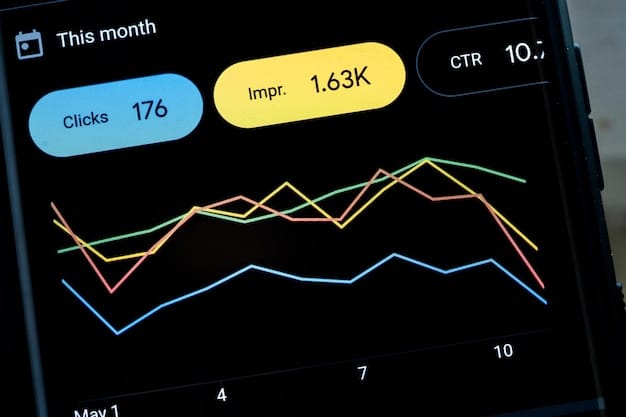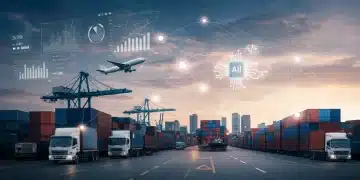Streamlining Supply Chains: US Companies Leverage AI for Faster Delivery

US companies are increasingly leveraging artificial intelligence (AI) to streamline their supply chains, resulting in significant improvements, including achieving approximately 10% faster delivery times through enhanced efficiency and optimized processes.
In today’s fast-paced market, efficiency in the supply chain is not just an advantage; it’s a necessity. US companies are turning to artificial intelligence (AI) as a key tool for achieving **streamlining supply chains: how US companies are leveraging AI for 10% faster delivery times**. This transformative technology is reshaping how businesses operate, manage logistics, and ultimately, deliver goods to consumers faster and more reliably.
The AI-Driven Supply Chain Revolution in the US
The integration of AI into supply chain management is rapidly changing the landscape for US businesses. This shift is driven by the need to reduce costs, improve efficiency, and meet ever-increasing customer expectations. AI’s ability to analyze vast amounts of data, automate processes, and predict potential disruptions makes it a cornerstone of modern supply chain strategy.
Predictive Analytics for Demand Forecasting
One of the most significant applications of AI in supply chains is predictive analytics. By analyzing historical sales data, market trends, and even social media sentiment, AI algorithms can accurately forecast demand. This allows companies to optimize inventory levels, reduce waste, and ensure that products are available when and where they are needed.
Automated Inventory Management
AI can also automate many aspects of inventory management. From tracking stock levels in real-time to triggering automated reorders when supplies are low, AI-powered systems reduce the need for manual intervention and minimize the risk of stockouts or overstocking.
- Improved accuracy in demand forecasting
- Reduction in inventory holding costs
- Minimization of stockouts and lost sales
- Real-time visibility into inventory levels
In conclusion, the AI-driven supply chain revolution is empowering US companies to make smarter decisions, optimize their operations, and ultimately deliver goods to customers faster and more efficiently. The ability to harness the power of data and automation is proving to be a game-changer in the competitive world of supply chain management.

Optimizing Logistics and Transportation with AI
Beyond inventory management, AI is playing a crucial role in optimizing logistics and transportation. From route planning to delivery scheduling, AI algorithms are helping companies to streamline their operations and reduce transportation costs.
AI-Powered Route Optimization
Traditional route planning methods often rely on static data and manual calculations. AI, on the other hand, can take into account real-time traffic conditions, weather patterns, and other dynamic factors to optimize routes and minimize delivery times. This not only reduces fuel consumption but also improves overall efficiency.
Autonomous Vehicles and Delivery Systems
While still in its early stages, the use of autonomous vehicles and delivery systems is gaining traction in the logistics industry. AI is essential for enabling these technologies, allowing vehicles to navigate complex environments and make deliveries without human intervention. This can significantly reduce labor costs and improve the speed and reliability of deliveries.
- Reduced transportation costs through optimized routes
- Improved delivery times and reliability
- Enhanced visibility into the movement of goods
- Potential for autonomous delivery systems
In summary, AI is revolutionizing the logistics and transportation aspects of supply chain management. By leveraging data-driven insights and automation, companies are able to optimize their routes, reduce costs, and deliver goods to customers faster and more efficiently.
Enhancing Supply Chain Visibility with AI
Visibility is key to managing a complex supply chain. AI-powered systems can provide end-to-end visibility, allowing companies to track goods as they move through the supply chain, from raw materials to the final customer.
Real-Time Tracking and Monitoring
AI algorithms can analyze data from various sources, such as GPS sensors, RFID tags, and IoT devices, to provide real-time tracking and monitoring of goods. This allows companies to identify potential delays or disruptions and take corrective action before they impact the customer.
Predictive Maintenance for Equipment
AI can also be used to predict when equipment, such as trucks or machinery, is likely to fail. By analyzing sensor data and historical maintenance records, AI algorithms can identify patterns that indicate potential problems. This allows companies to perform proactive maintenance, minimizing downtime and ensuring that the supply chain remains operational.
In conclusion, enhancing supply chain visibility with AI makes it possible for US companies to proactively manage risks, respond quickly to disruptions, and ensure the smooth flow of goods. This heightened visibility is crucial for building resilience and agility in today’s unpredictable business environment.

AI for Risk Management and Disruption Mitigation
Supply chains are vulnerable to a wide range of risks, from natural disasters to political instability. AI can help companies to identify and mitigate these risks, ensuring that the supply chain remains resilient in the face of adversity.
Predicting and Preventing Disruptions
By analyzing data from various sources, such as weather forecasts, news reports, and social media feeds, AI algorithms can predict potential disruptions before they occur. This allows companies to take proactive steps to mitigate the impact of these disruptions, such as rerouting shipments or diversifying suppliers.
Optimizing Supply Chain Resilience
AI can also be used to optimize the overall resilience of the supply chain. By simulating different scenarios and analyzing the potential impact of various disruptions, AI algorithms can identify weaknesses in the supply chain and recommend changes to improve its ability to withstand shocks.
- Proactive identification of potential disruptions
- Optimization of supply chain resilience
- Improved risk mitigation strategies
- Enhanced ability to respond to unforeseen events
In summary, AI offers powerful tools for managing risks and mitigating disruptions in the supply chain, protecting US companies from potential losses and ensuring business continuity even in challenging circumstances.
Challenges and Considerations for AI Implementation
While the benefits of AI in supply chain management are clear, there are also challenges and considerations that companies need to address when implementing these technologies. From data quality to talent shortages, there are a number of hurdles that need to be overcome.
Data Quality and Availability
AI algorithms are only as good as the data they are trained on. If the data is incomplete, inaccurate, or biased, the AI system will produce unreliable results. Companies need to ensure that they have high-quality data and robust data management practices in place before implementing AI.
Talent and Expertise
Implementing and managing AI systems requires specialized skills and expertise. There is currently a shortage of qualified AI professionals, which can make it difficult for companies to find the talent they need. Companies may need to invest in training and development programs to build the necessary expertise in-house.
In conclusion, while the implementation of AI in supply chains presents some challenges, these can be overcome with careful planning, investment in the right technologies and talent, and a commitment to data quality.
Real-World Examples of AI Success in US Supply Chains
To illustrate the tangible benefits of AI, let’s examine some real-world examples of US companies that have successfully implemented AI in their supply chains, achieving significant improvements in efficiency.
Case Study: A Major Retailer
A major US retailer implemented an AI-powered demand forecasting system, resulting in a 15% reduction in inventory holding costs and a 10% increase in sales. The system was able to accurately predict demand for various products, allowing the retailer to optimize inventory levels and avoid stockouts.
Case Study: A Manufacturing Company
A manufacturing company implemented an AI-powered predictive maintenance system, resulting in a 20% reduction in equipment downtime. The system was able to identify potential equipment failures before they occurred, allowing the company to perform proactive maintenance and avoid costly disruptions to production.
These case studies demonstrate the transformative power of AI, showcasing how US companies are leveraging this technology to achieve significant improvements in efficiency, reduce costs, and enhance their competitiveness.
The Future of AI in Supply Chain Management
The future of AI in supply chain management is bright. As AI technologies continue to evolve, we can expect to see even more innovative applications emerge, further transforming the way companies manage their supply chains. The combination of AI with other technologies like blockchain and IoT will create even more powerful capabilities.
AI and Blockchain Integration
The integration of AI and blockchain can provide even greater transparency and security in the supply chain. Blockchain can be used to create an immutable record of all transactions, while AI can be used to analyze this data and identify potential fraud or inefficiencies.
AI and IoT Integration
The integration of AI and IoT can enable real-time monitoring and control of the supply chain. IoT devices can be used to collect data on the location, condition, and performance of goods as they move through the supply chain, while AI can be used to analyze this data and optimize operations.
| Key Point | Brief Description |
|---|---|
| 📊 Predictive Analytics | AI forecasts demand, optimizing inventory and reducing waste. |
| 🚀 Route Optimization | AI-powered systems optimize logistics for faster, cheaper deliveries. |
| 🔍 Risk Management | AI predicts and mitigates supply chain disturbances. |
| 💻 Data-Driven Decisions | AI enhances decision-making with real-time data for superior insight. |
FAQ
▼
AI optimizes routes for faster transit, predicts potential delays, and automates processes, helping companies achieve deliveries approximately 10% faster.
▼
AI analyzes diverse data, including historical sales patterns, real-time traffic updates, weather forecasts, and social media trends, for insightful decision-making.
▼
Key challenges include ensuring quality and availability of data, bridging expertise gaps in AI, and managing implementation complexities for optimal integration.
▼
Yes, AI enhances risk management. It predicts disruptions like natural disasters, simulates scenarios for better resilience, and proactively reroutes shipments.
▼
AI and blockchain together boost transparency and security. Blockchain provides a transaction record, and AI analyzes this data for fraud detection and efficiency increases.
Conclusion
In conclusion, the integration of AI into US supply chains is a transformative process. While challenges exist, the potential benefits, including faster delivery times, optimized logistics, and improved risk management, are substantial. As AI technologies continue to advance, companies that embrace this change will be well-positioned to thrive in an increasingly competitive global marketplace.





